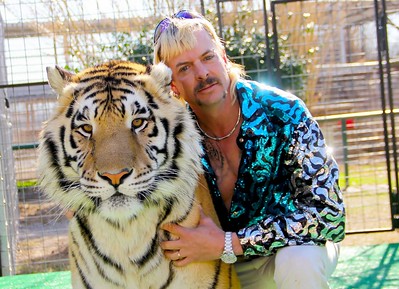Tiger King: Murder, Mayhem, Madness

Netflix
Tiger King released on Netflix Mar. 20 to varied reactions
May 28, 2020
The American True Crime documentary series titled “Tiger King: Murder, Mayhem, Madness” officially released on the streaming platform Netflix on Mar. 20. The seven episode show follows the outlandish lifestyle of tiger-breeder Joseph Maldonado-Passage, otherwise known as Joe Exotic. Exotic is the former owner of the Greater Wynnewood Exotic Animal Park in Oklahoma and is now serving 22 years in prison for planning to kill career enemy Carole Baskin in a murder-for-hire plot.
Directors Eric Goode and Rebecca Chaiklin stated that the exigency in the production of “Tiger King,” was the sheer number of wild animals held in captivity across the United States. The two of them sought out stories that highlighted the unfortunate truth behind big cat breeding. What began as a feature film soon began to delve into the individual personalities showcased in the series.
Ultimately, the show doesn’t achieve its main purpose of shedding light on the large number of big cats that are held in captivity; instead the Netflix series sensationalizes the industry and fails to bring any substance to viewers.
The docu-series sheds light on the unusuality of big cat breeders, and presents a constant moral dilemma throughout the show. Legality is a lost concept as viewers are taken on a never ending crusade of sex cults, tiger cruelty, interstate animal trafficking, and countless other questionable instances. And while the show’s main arc follows the relentless enmity between Joe Exotic and Carole Baskin – the owner of Big Cat Rescue animal sanctuary – their friction appears tame in comparison to the endless slew of side stories portrayed in the show. Exotic’s business partner of sorts Bhagavan “Doc” Antle, is one such fringe highlight, and is portrayed as a womanizer who coerces his female employees to sleep with him in order to achieve enlightenment.
Antle’s former employee, Barbara Fischer, recounts her experiences working for him in the second episode: “Cults of Personality.”
“You know, we lived in these terrible horse stalls, basically. Like, with sliding doors with bars on them… Doc says ‘You’re this garbage person, but if you listen to me, I’ll make you great.’” Fischer said.
The personal accounts from Fischer, and the interviews conducted with employees of the zoo, highlight the toxicity of several animal handlers in the industry. The show briefly introduces several such instances of debauchery and vice, but moves on swiftly and fails to elaborate further on the content. But, much of the appeal for the show does come from it’s fast paced approach at providing glimpses into the lives of big cat breeders.
The most astounding part of the show is the constant commercialization of tigers, and the use of cubs as an aphrodisiac at prominent clubs and venues. The Atlantic review aptly said that “There are no heroes in Tiger King.” It’s especially challenging to find a character who’s morals you truly stand behind, because even the slightly relatable characters have an edge to them. Take Baskin for example; upon first look she seems to be the peaceful conservationist. She refers to Big Cat Rescue as an “animal sanctuary” and uses volunteer efforts to care for the animals residing on her land. As tranquil as she may appear, viewers are soon introduced to the swirl of conspiracy theories surrounding Baskin’s role in the death of her ex-husband, Don Lewis. Forgoing the blatant crimes and moments of very contentious legality, the one resounding question everyone has when they finish the show is: “Did Carole Baskin kill her husband?”
The self-labeled documentary series barely counts as a documentary; lacking expert voices and true testimonials. The focus of the show lies too heavily in the “King,” and completely under shadowed the “Tiger.” While Exotic was implicated in hiring a hit-man to kill Baskin, he was also charged with nine violations of the Endangered Species Act. The Netflix show seemingly glosses over the blatant violations of animal protection acts and presents a weak expose on tiger captivity.
The only good to come from “Tiger King” is Exotic’s authentically meme-able country songs and debatable outfit choices. The show falls severely short of an insightful documentary, and doesn’t instill the same internal rage that the award winning documentary “Blackfish” did. Blackfish caused public outcry and protest over the treatment of orca whales in captivity, but I don’t foresee the same change incited from “Tiger King.” If your sole interest is to find a show that has a mix of drama and “wow-factor,” then Tiger King may be right up your alley. But if you’re looking to see a revelation on the abysmal state of animal trafficking, “Tiger King” is not that.
At its best, the show is a futile attempt at uncovering the truth behind tiger captivity. It’s safe to say that “Tiger King” did nothing for the betterment of tigers in private ownership.



